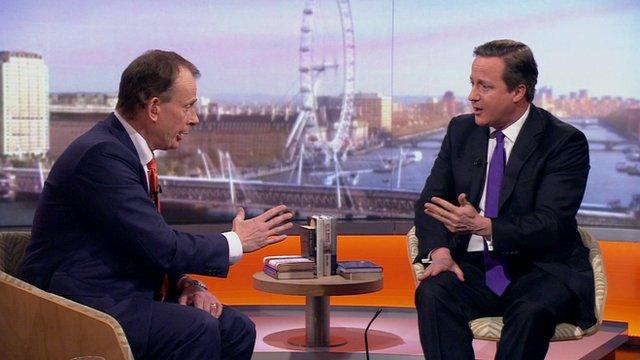Policy costings: Battle of the nerds
- Published
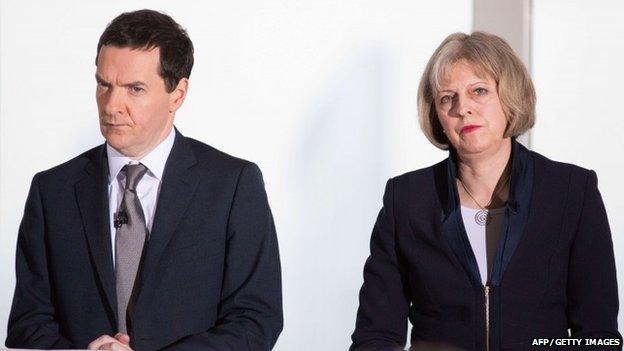
Tories including George Osborne and Theresa May have accused Labour of unfunded spending pledges
I call it the battle of the nerds. Party researchers spend months noting every policy commitment, promise and hint made by their opponents on the airwaves.
They estimate how much these promises might cost. They then publish documents saying the sums don't add up.
The other side's researchers then work hard and fast to produce a counter document, picking holes in their opponent's numbers and assumptions.
It is a contest in which a lot of clever policy wonks earn their colours. And it is a contest that rarely sheds much light.
At best, these campaign documents clarify for voters the differences between the lazy nods and winks of spokesmen and a party's firm policy commitments. They flush out the detail of policy commitments that parties would rather keep in the shadows.
At worst, these documents confuse voters by conflating policy with aspiration. It is hard work for the party researchers compiling all the quotes and it is hard work for the media sorting the truth from the chaff.
Extra spending?
Let me give you an example by looking in detail at two of the Conservatives' claims.
One of their stronger arguments relates to Labour's promise that it would give mental health patients access to the same treatments and resources as patients with physical conditions.
The party's National Policy Forum report last September stated: "Labour will ensure that patients with mental health problems have equal treatment and resources as patients with physical illnesses… The needs of children with mental ill health are currently poorly addressed, with limited services provided.
"A future Labour government will ensure that this area of child healthcare will be properly resourced and that children needing mental healthcare will have their needs prioritised at the same level as those suffering from physical conditions."
The Conservatives make an assumption that Labour would take five years to achieve this and make a calculation that this would cost £2.7bn in the first year.
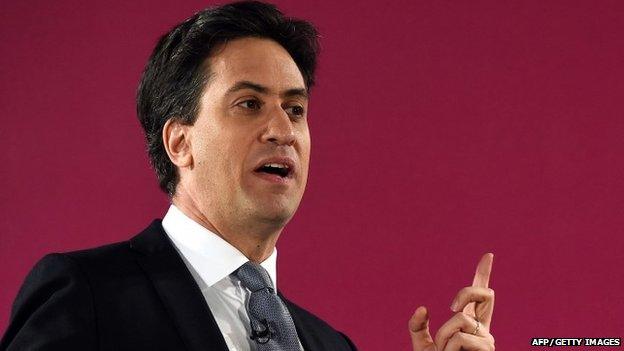
Ed Miliband has said every measure will be paid for "either by a tax change or a change in spending"
I asked Labour how they would fund this policy and it turns out that it is not as clear as one might assume.
A spokesman said Labour had not said how long it would take to give mental health patients equal treatment and resource as other patients. He said that this policy reflected a long-term shift that is already taking place within the NHS and there is no assumption of extra spending "over and above the NHS budget".
He also said that Labour was not necessarily promising parity in budgets because the cost of mental health treatments differed from those for physical ailments.
Labour then backed this up in its subsequent rebuttal document saying the Tories have "wilfully misinterpreted" Labour's policy, which is about "ensuring the health and care system gives mental health the focus it deserves, rather than a point about programme budgets".
'Arithmetic equivalence'
It went on: "The Tories are falsely claiming that Labour's desire to see "patients with mental health problems have equal treatment and resources as patients with physical illnesses" means we are committed to increasing the mental health budget by £13bn a year by 2020, resulting in extra spending of £2.7bn in 2015-16.
"This is not Labour's policy. Rather, our desire to see 'patients with mental health problems have equal treatment and resources as patients with physical illnesses' is a desire for parity of esteem between mental health and physical health.
"Specifically, we want to ensure that mental health problems are taken just as seriously as physical health problems and that services are appropriate to meet mental health needs as they are to meet physical health needs. That kind of equality is not a point about arithmetic equivalence of programme budgets."
Now you can question the Conservative's methodology and assumptions, you can question their final calculations, but this Labour policy is not as clear or fully funded as one might have supposed from reading their initial document.
A promise of "equal treatment and resources" for mental health patients has become "parity of esteem" and has nothing to do with "arithmetic equivalence of programme budgets".
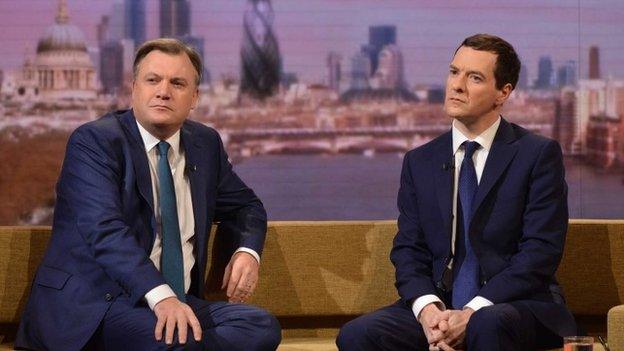
The first skirmish of the new political year has been fought on Labour's plans for the economy
Let us now take one of the Conservative's weaker examples relating to Labour's plans for local authority spending cuts.
The Tories claim that Labour would cancel local authority cuts worth £3.3bn. As evidence, they cite fourteen quotes from Labour frontbenchers criticising cuts to libraries, social care, street lights, buses, and public loos.
The shadow communities secretary Hilary Benn is quoted attacking these cuts as "unfair and disproportionate".
But nowhere in this long list of quotes is there anything like a commitment from Labour to reverse these cuts or cancel future cuts.
The shadow chancellor, Ed Balls, spent much of the day on the airwaves making it pretty clear that Labour will not tear up these council cuts.
He believes he can make up much of the reduction by making more councils co-operate and share resources and make further efficiencies.
Osborne 'quietly content'
So there is a huge gap between the Conservatives noting that Labour is criticising a cut and then making the assumption that Labour is going to cancel it.
So much for the specifics. Elections are rarely won or lost in the murky undergrowth of these kinds of dossiers. But what can matter is the impression these documents leave.
George Osborne's efforts have come in for much criticism. Labour has challenged many of the assumptions and reminded voters that the Conservatives themselves have promised unfunded tax cuts worth £7bn.
But the chancellor will not mind. Polls suggest when it comes to fixing the economy, voters trust him and his party over Labour. So Mr Osborne is spending some of that political capital to keep the electoral focus on the Conservatives' chosen ground of the economy.
Even if this dossier ends up making a small dent in the Tories' economic credibility, Mr Osborne will be quietly content. The first skirmish of the new political year has been fought not on the NHS or immigration but on Labour's plans for the economy. And that is turf where Mr Osborne is quite happy to tread.
- Published5 January 2015
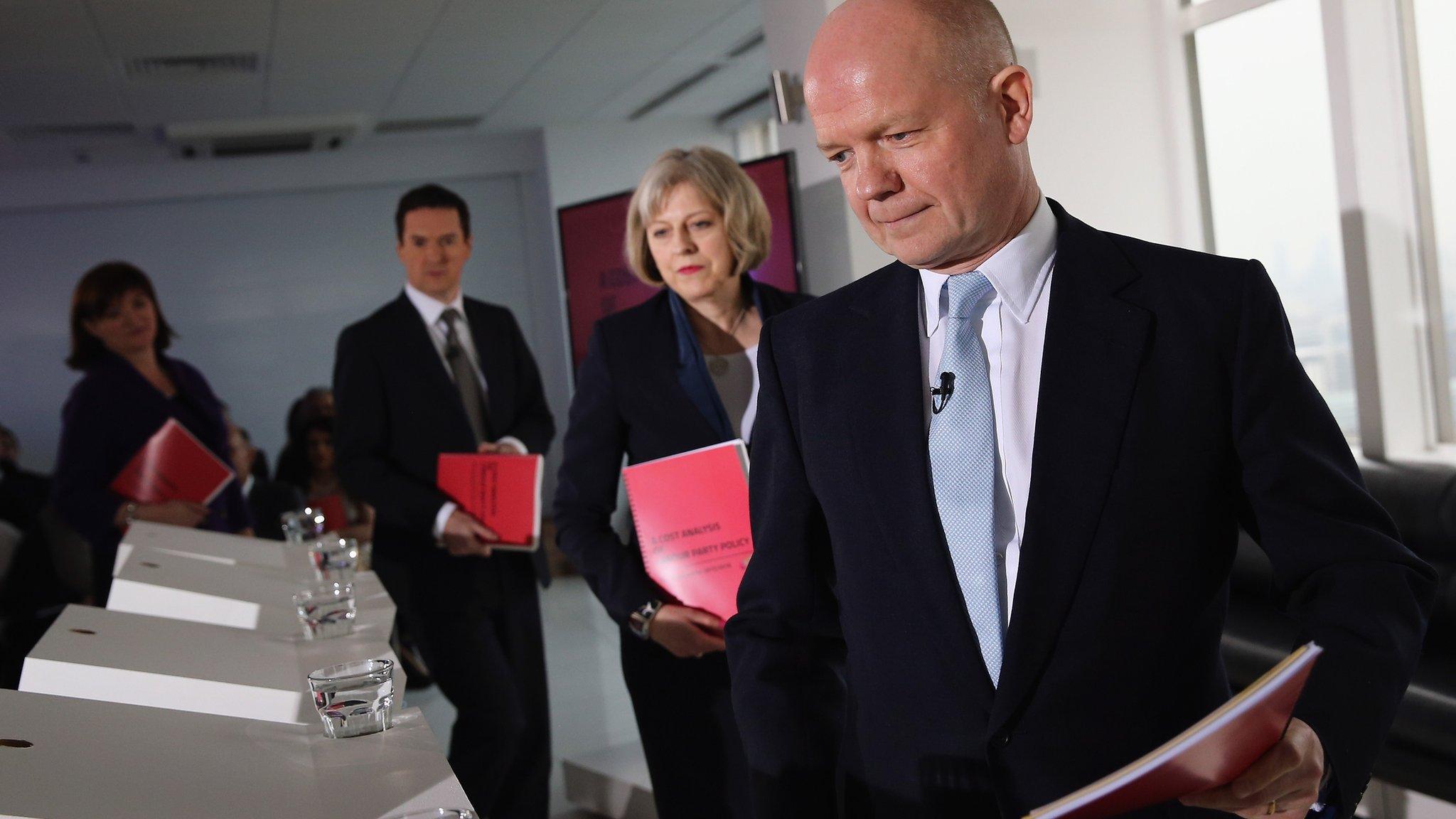
- Published5 January 2015
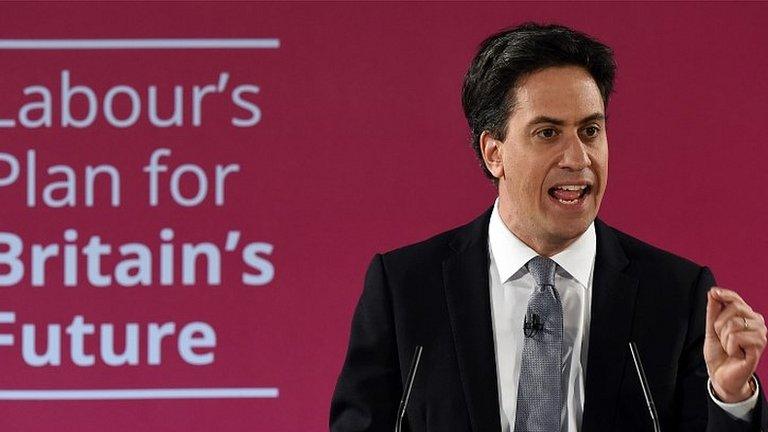
- Published4 January 2015
